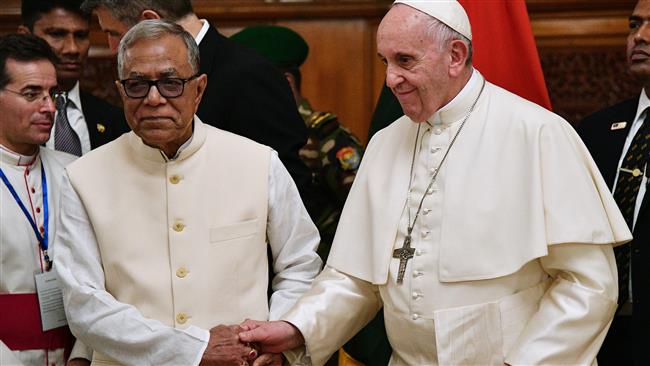
RNA - More than 700,000 people have fled to Bangladesh after Myanmar’s military launched what the UN has described as a textbook example of "ethnic cleansing" of Rohingya Muslims.
Pope Francis arrived from Myanmar after a three-day visit to the country, and will stay in Bangladesh for three days on the second leg of his six-day tour.
Shortly after arrival on Thursday, he urged the international community to take “decisive measures” to address the grave humanitarian crisis in the region.
“It is imperative that the international community take decisive measures to address this grave crisis, not only by working to resolve the political issues that have led to the mass displacement of people, but also by offering immediate material assistance to Bangladesh in its effort to respond effectively to urgent human needs,” he said.
"None of us can fail to be aware of the gravity of the situation, the immense toll of human suffering involved, and the precarious living conditions of so many of our brothers and sisters, a majority of whom are women and children, crowded in the refugee camps," he added.
Pope Francis, despite expectations of brave and straightforward support for the Rohingya refugees, has been very reticent during his visit and refrained from publicly slamming Myanmar for the ethnic cleansing campaign against the country's Muslims.
Pope Francis, who in the past called the minority group by name, has so far not used the term Rohingya during his visit to Myanmar and Bangladesh.
Instead, he referred to the persecuted minority group only as the “refugees from Rakhine state” in a bid not to upset Myanmar's authorities.
Bangladesh's President Abdul Hamid, however, strongly condemned Myanmar for committing "ruthless atrocities" against the Rohingya Muslims.
Hamid said thousands of Rohingya men, women and children have been brutally killed, their homes burned to ashes, and thousands of women raped by the military.
He said during critical times Bangladesh welcomed the refugees with open arms, but now the onus was upon the international community in a "shared responsibility" to help Bangladesh safely return the Rohingya to their homes and guarantee their safety and rights for a "social, economic and political life in Myanmar."
In Myanmar, the "stateless" Rohingya community, which has resided in the country for many generations, is referred to as "Bengali" to imply that they are foreign migrants from Bangladesh, and therefore, denied basic civil rights of citizens.
Myanmar's government claims Bengali migrants are not entitled to full citizenship.
Pope's failure
Pope Francis praised the government and people of Bangladesh for giving refuge to the "refugees from Rakhine state."
On Thursday, the Vatican rejected suggestions that the 80-year-old pope's failure to tackle the Rohingya crisis represented a failure in leadership.
"He seemed to comprehend the dilemma he faced," David Mathieson, a Yangon-based analyst, told the French news agency AFP.
Analysts say the dilemma is that if he uses the name Rohingya, he will enrage the Buddhist-majority nation of Myanmar who will then target the Catholics in the country.
Rohingya -- originally read Rakhingya – translate into the people from Rakhine, indicating that these people originate from that region.
847/940